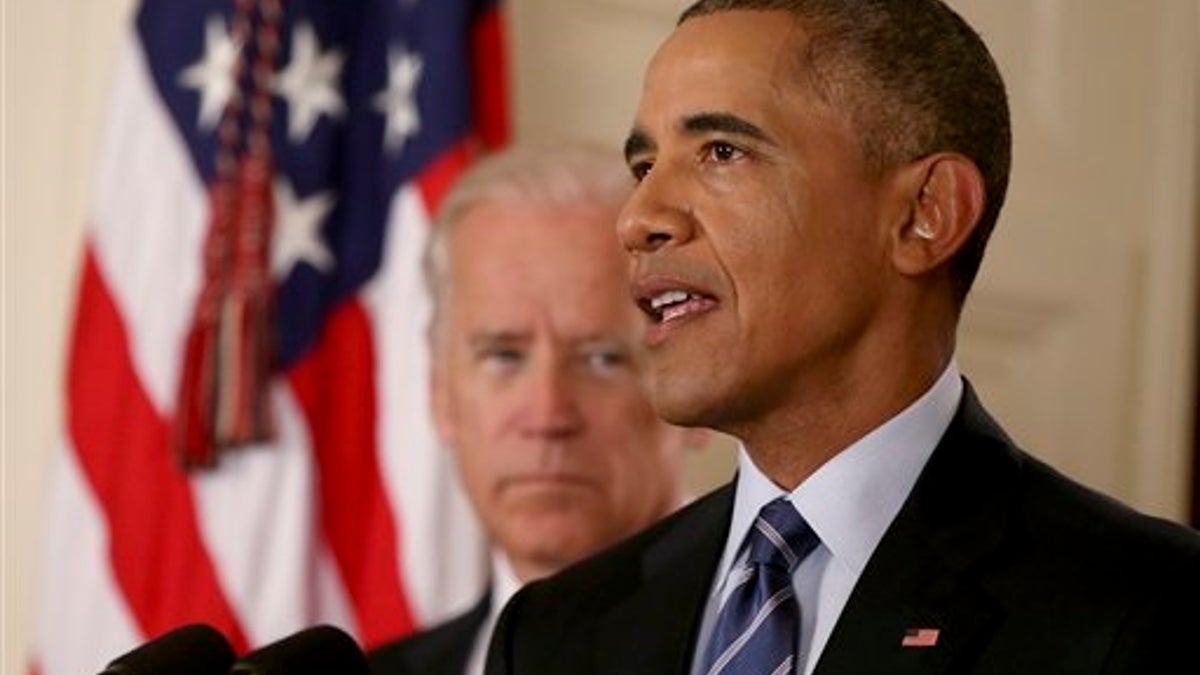
President Barack Obama, standing with Vice President Joe Biden, delivers remarks in the East Room of the White House in Washington, Tuesday, July 14, 2015, after an Iran deal is reached. Obama says every path to a nuclear weapon will be cut off from Iran under a historic agreement announced in Vienna. (AP Photo/Andrew Harnik, Pool)
In April, President Obama announced the framework of a deal that he said would prevent Iran from obtaining a nuclear weapon.
“We only have three options for addressing Iran’s nuclear program” -- cutting a deal with Iran, “starting another war in the Middle East” or “hope for the best.”
In deploying his favorite rhetorical device, the president reaffirmed to the world he only really saw one option: cutting a deal with Iran no matter the cost.
If after witnessing six years of President Obama’s weak and feckless foreign policy wasn’t enough to embolden the regime in Tehran, President Obama’s comments in April must have convinced the mullahs they had the American president right where they wanted him.
The price for President Obama’s penchant for negotiating from weakness is now clear. The deal announced with much fanfare by the White House two weeks ago comes nowhere close to the deal President Obama promised the American people he’d get.
Far from the promise of preventing “Iran from obtaining a nuclear weapon,” the deal brokered by President Obama and Secretaries of State Hillary Clinton and John Kerry guarantees that the world’s foremost state sponsor of terror will be a nuclear threshold state in the next 15 years, but probably much sooner.
The details of the breadth and scope of President Obama’s capitulations to Tehran are startling, even by his standards. But most alarming of all is the realization that President Obama decided to elevate an evil and illegitimate third-rate autocracy.
In order to ensure that the damage done by President Obama can be repaired, we need to learn the lessons of his failures.
They began long before he reached the White House, when during his campaign for the presidency he announced his willingness to meet, without preconditions, with the leaders of Iran, Syria, Venezuela, Cuba and North Korea.
When American presidents speak, leaders around the world, both friends and foes, listen. And the listening begins long before the president is sworn into office. In addition, how candidates aspiring for the presidency now talk about Iran will send a clear signal to the world about their foreign policy vision. Our allies and adversaries alike want to know whether America will continue the retreat from the world begun by President Obama and Secretary of State Hillary Clinton, or will America return to its indispensable leadership role in the world?
Making that case begins now, by making it clear to the American people and the world that this is President Obama’s deal with Iran, not America’s deal with Iran.
The next President must campaign for the office on the principle that has long guided American foreign policy toward Iran – that the regime cannot have mastery of dangerous nuclear technologies. Period.
The next president must re-impose the sanctions waived by President Obama and work with Congress to impose new crushing sanctions on Iran’s leaders for their ongoing support for terrorism and brutal human rights abuses.
This will require engagement with our European allies to lead them toward a different approach to Iran than the Obama-Clinton approach. Part of this reengagement must make it clear that European security does not benefit by empowering Iran’s terrorist proxies and missiles that can hit Europe’s cities. But the rest of the world also needs to realize that if Europe intends to pursue a strategy that empowers an unreformed Iran, America will put our security interests first.
The next president must give Iran a choice: change your behavior, or face the collapse of your economy due to U.S. pressure. Despite its inflammatory rhetoric, Iran’s clerical dictatorship has immense vulnerabilities. Iran’s economy continues to suffer from inflation and unemployment while rampant corruption plagues the state at all levels.
A strategy of pressure will not just focus on Iran’s economy, but also its regional position. For Iran’s leaders to make painful concessions they have avoided thus far, they need to understand that there are consequences for their actions. The U.S. should undertake a systematic effort to isolate Iran in the Middle East. The Islamic Republic, its clients and proxies, should find no sanctuary in the region. The U.S. must do all it can to counter Iran’s nefarious plots in places like Iraq, Lebanon, Gaza, Syria or Yemen.
This will be advanced by shoring up our alliance with Israel. The first step will be an end to the threatening rhetoric from senior U.S. officials warning of Israeli isolation and dismissing Israeli government leaders “who know what they’re talking about.”
President Obama’s capitulation has made it more difficult, but not impossible, to prevent a nuclear Iran. He has failed with Iran because he has failed as president. This may be the best deal that a weak president can achieve, but a strong, trusted and respected America can do much better.
Those who aspire to lead the greatest nation on Earth cannot wait until 2017 to begin making the case for a new approach toward this critical issue to the American people, and the world.
